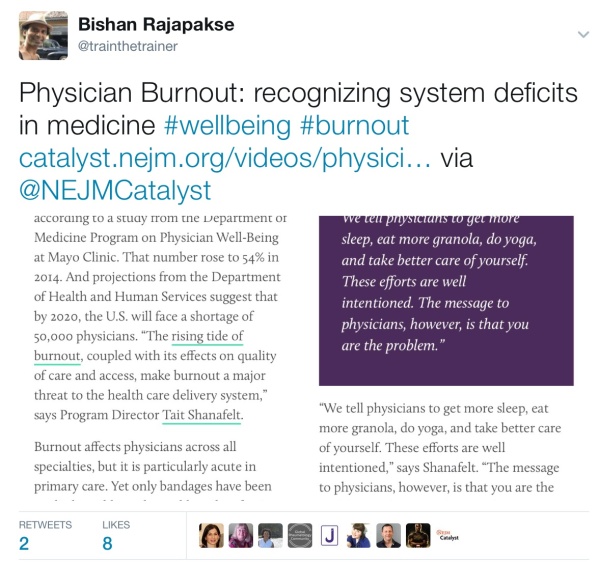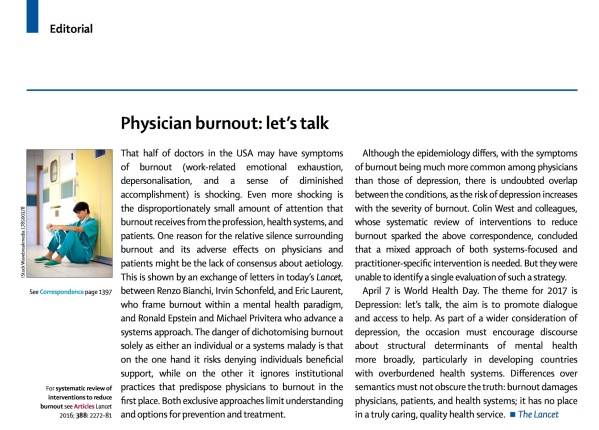
http://catalyst.nejm.org/videos/physician-burnout-stop-blaming-the-individual/
The above is a link to a brilliant talk by the program director for Physician Wellbeing from the Mayo Clinic, Tait Shanafelt, illustrating how physician burnout is a “system issue”.
“We tell physicians to get more sleep, eat more granola, do yoga, and take better care of yourself. These efforts are well intentioned,” says Shanafelt. “The message to physicians, however, is that you are the problem, and you need to toughen up.”
Shanafelt goes on to describe how the six drivers of burnout amongst physicians are largely derived from the characteristics in the work environment.
These drivers are stated as;-
1) Excessive workload
2) Inefficiency and undue clerical burden
3) Loss of flexibility and control over work
4) Problems with work-life integration
5) Loss of meaning in work
6) Organisational objectives that conflict with the altruistic values of the profession
He also states that promoting professional wellbeing is the shared responsibility of individual physicians and healthcare organisations.
Whilst this talk comes from the US setting, I believe the themes that are discussed are becoming increasingly relevant to the Australasian healthcare. My own observations from working in a number of busy tertiary and secondary hospitals across Australia and New Zealand is that we have developed highly efficient systems of delivering essential medical “management”, however, heartfelt “care” appears to have become optional extra.
Hearts in Healthcare
An increasing number of doctors, and doctors in training, have experienced disillusionment the conditions of medical training, and practice, and at the consequential neglected dimension of “care”. I have had countless conversations with caring physicians over the past 5-10 years, at all levels, which has led me to believe that there is a deeply “broken” element to the current healthcare system. Some have felt strongly about the issue of restoring humanity, and the heart, back into medicine that they have also made it their life’s work.
For example, Dr Robin Youngsen, who is a NZ Anaesthetist, has highlighted the importance of creating “time to care” in his first book, which takes on this very title. He also furthered this message his recent TED talk “perfectly broken and ready to heal”, and has set up an organisation dedicating to rehumanising healthcare, called “hearts in healthcare”.
The power of humanity in health care
Looking both forward and backwards in time, isn’t it “humanity” that is at the what is special and important in healthcare?
It seems to me that through a greater understanding, and appreciation, of the benefits of the “human side” of medicine, it is still possible to steer the evolving culture of healthcare in a better direction.
The opening story in Tait Shanfelt’s talk perhaps conveys this better than any, where he recalls how one particular doctor took a deeper interest in his son on a personal level, when he was a patient in hospital. Despite the all round exceptional treatment his son received in hospital, it was this one persons humane interactions that stood out, and also meant so much to him.
Which future shall we steer towards : physician burnout, or, physician wellbeing?
I am a big believer of the notion that often the question is more important than the specific answers.
We now know that burnout exists in high proportions than ever before , but the question remains, how do we respond to this rising tide? Perhaps one strategy can be rather than reacting to the negative effects of burnout, we can proactively create more wellbeing?
But how do we apply this vision in local physician settings settings? Perhaps a start is by asking the question “what can we be doing to improve physcian wellbeing?”.
What am I doing to improve my wellbeing?
What is happening within my hospital or training organisation?
…and
How can I help this ever-growing movement?
What are your reflections on preventing physcian burnout, and promoting a culture of physician wellbeing? I would love to know your views.
I’m just putting this out to further the coversation, between the ever-growing, increasingly diverse network of caring physicians who have a vision of healthcare that values the wellbeing of all, starting with the one who cares.

Ref: http://www.thelancet.com/pdfs/journals/lancet/PIIS0140-6736(17)30940-6.pdf
Couldn’t agree more Bish.
After 22 years working in medicine what I see is doctors getting progressively disenchanted. The passion I recall as a young doctor seems a distant concept for many entering the ranks, and a forgotten past for many already there. The “solutions” coming into our systems suggest we need to try harder, cope better, meditate more and care more. The very fact our doctors are burning out shows we still care. What has changed is the system we work in has become more complex, and the paperwork and administration required to work within it has meant doctors spend more time on administration than medicine.
What we need to do is design the system to deliver care which meets the patients needs for caring and the doctors needs for delivering it. When doctors are working hard in a system which delivers the best care every time and in a compassioante way – the satisfaction they feel is what sustains them, in fact they thrive. When the care is about deadlines, documenting to protect yourself and money – no-one is satisfied, especially the patients.
If someone is drowning you don’t tell them to swim harder and meditate on their swim/life balance – you pull them out of the water! Doctors are drowning, and all we are doing is telling them to swim harder.
As a Medical Administrator now, I see the need for a seismic shift in the system – one that allows us to responsibly manage our finances and efficiencies for responsible healthcare delivery, whilst delivering care not just health. It is a huge change – but I believe it is the only way forward.
If we can achieve that – we can save our doctors from burnout and in the process deliver the best healthcare possible.
Thanks for sharing your comments and views Jaqui, I value your perspective and experience in the field. I believe that change we want to see is already on its way- the seeds have been planted – perhaps long ago, at the same time that the unruly weeds were growing , but we must nurture the soil? I always dedicate a proportion of my energy towards “self-care” and prioritize it over outward care; sound selfish but I’ve tried the other way – and it’s not sustainable. So perhaps, the more we champion “self-compassion”, the more we unwitting champion better patient care? At least that’s my hypothesis, and I continue to allows myself to be the research subject 😂😜🌈